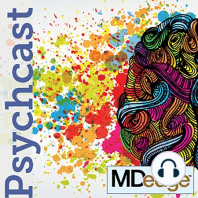7 min listen
Psychcast meets PsychEd
FromPsychcast
ratings:
Length:
48 minutes
Released:
Aug 14, 2019
Format:
Podcast episode
Description
Lorenzo Norris, MD, host of the MDedge Psychcast and editor in chief of MDedge Psychiatry, interviews the psychiatry residents who produce the PsychEd podcast, which as they put it, is “created by medical learners, for medical learners.” Dr. Norris speaks with some of the members of PsychEd podcast team: Sarah Hanafi, MD, a first-year resident in psychiatry at McGill University, Montreal; Alex Raben, MD, a fourth-year resident in psychiatry at the University of Toronto; Lucy Chen, MD, a fourth-year psychiatry resident at the University of Toronto; and Bruce Fage, MD, a fifth-year psychiatry resident at the University of Toronto. And later, in the “Dr. RK” segment, Renee Kohanski, MD, discusses the role of the placebo in the modern setting. Dr. Kohanski is a member of the MDedge Psychiatry Editorial Advisory Board and is a psychiatrist in private practice in Mystic, Conn. Show Notes by Jacqueline Posada, MD, who is a consultation-liaison psychiatry fellow with the Inova Fairfax Hospital/George Washington University program in Falls Church, Va. Why podcasting? The PsychEd podcast originated when the team identified a gap in podcast-mediated learning for psychiatry trainees. In psychiatry, there have been podcasts that reviewed recent publications, but none that examined foundational topics. Other specialties, such as emergency medicine, have several podcasts covering basic topics aimed at trainees. Podcasts are identified as an asynchronous educational material. They are a medium that can be used in “downtime,” especially because many trainees commute or have other time during which they can consume information. At the American Psychiatric Association’s 2019 Annual Meeting, the PsychEd team presented on the integration of podcasting into medical education. Materials should focus on digital natives vs. digital immigrants. In 2015, one research group polled emergency medicine residents and found a differential in the use of podcasts; 90% of users were residents and 45% were program directors. Podcasts are a supplement to other types of learning Podcasts can distill information as well as engage with information and experts in an alternative fashion. Podcasts are efficient in their use of time and broaden listeners’ exposure to information and experts. Podcasts offer one modality of learning and are not meant to replace other sources. Resources should focus on what information is needed and be tailored to where students, residents, and all learners spend their time. PsychEd beginnings After the team identified the need for a psychiatry education–focused podcast, they started meeting to create an environment for collaboration. Learning how to podcast – using the equipment, editing the recording, and uploading to relevant platforms – was the hardest part. All PsychEd podcasting is done “live.” The team takes their recording equipment to the experts they interview. Presently, their guests are located in Toronto. The team has expanded to Montreal with a new team member, Sarah Hanafi, a first-year psychiatry resident at McGill University. Formatting The podcast started with a case-based format, using a composite case presented to an expert, followed by a junior learner asking questions. Now the team does more prep work to create a structured script that includes educational objectives. Using a script allows for the interview to flow in a more organized structure, which makes for easier editing. Meeting and preparing the script with experts demands time and preparation in order to create the milieu for a generative interview. Most often, the “pearls” come from the unscripted questions that elicit reflections. Experts have been willing and excited to participate in the podcast and to disseminate their knowledge in a format that will reach trainees. PsychEd topics So far, PsychEd has covered basic topics of psychiatry, including major depressive disorder, schizophrenia, bipolar disorder, and anxiety, and it is now expanding to mor
Released:
Aug 14, 2019
Format:
Podcast episode
Titles in the series (100)
Schizophrenia with Dr. Henry Nasrallah: Welcome to the MDedge Psychcast, the new podcast from Clinical Psychiatry News and Current Psychiatry. In this first episode, Lorenzo Norris, MD, talks with Henry A. Nasrallah, MD, about some of the etiology, presentation, and recent advances in... by Psychcast
